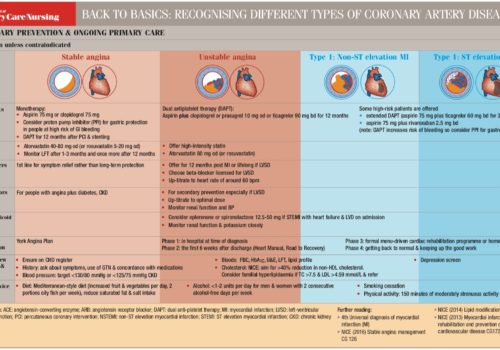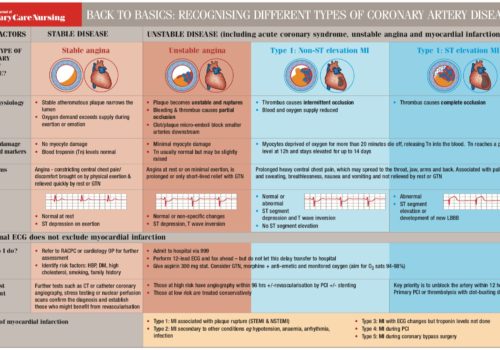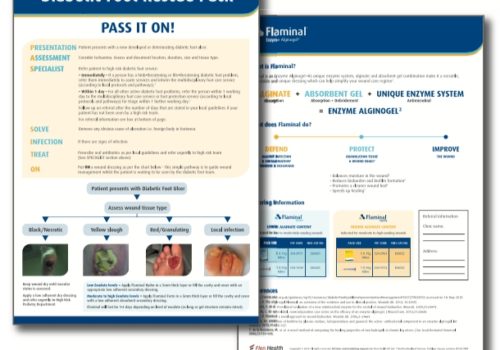Community pharmacists are widely recognised as an under-utilised resource within the NHS, in spite of their skills and experience, and the accessibility of their premises. In recent years, community pharmacists have demonstrated the value of the clinical services they offer, particularly in the prevention of cardiovascular disease (CVD).
‘The super intervention’ – Physical activity nurse champions
If physical activity were a pill we would prescribe it because of its wide-reaching positive impacts on major long-term conditions. The aim of this article is to outline the growing evidence base supporting the benefits of physical activity and to identify the harms from inactivity. However, only a minority of healthcare professionals seem to be familiar with the current Chief Medical Office (CMO) physical activity guidance.
Back to Basics: Recognising different types of coronary artery disease 2
This month’s double Back to Basics feature focuses on coronary artery disease and understanding the differences between stable angina, unstable angina, STEMI and NSTEMI, and their secondary prevention and management in primary care.
Back to Basics: Recognising different types of coronary artery disease 1
This month’s double Back to Basics feature focuses on coronary artery disease and understanding the differences between stable angina, unstable angina, STEMI and NSTEMI, and their secondary prevention and management in primary care.
Talking about sex, hormones and the heart
The NICE 2015 guidelines on the diagnosis and management of menopause provides useful evidence-based guidance on the menopause, but it is unclear if many GPs are able to confidently prescribe appropriate hormone replacement therapy (HRT). This brief article gives an overview of the importance of HRT and aims to help GPs to manage their patients experiencing menopause.
Case study: Nurse COPD assessment
This case describes a 56-year old male with a productive cough and worsening breathlessness who presented to a practice nurse. This case study was part of a Health Assessment module at the University of Surrey. The case study was supervised by a GP.
‘PASS IT ON’ – Saving legs, lives and money
Foot ulceration in people with diabetes is an increasing problem which is costly to the NHS financially and to patients in terms of quality of life. Management is complex and involves a team approach to ensure the best results for patients.
BHF blood pressure pilots: Changing the conversation about hypertension
As many as 16 million people in the UK are estimated to have hypertension, and around 7 million of these are undiagnosed. Of those diagnosed in England, one third are not receiving optimum management.
Dietary interventions for weight loss: What works?
Obesity is estimated to be responsible for more than 30,000 deaths each year, reducing lifespan by an average of nine years. The links between obesity, diabetes and cardiovascular disease are well documented, but overweight and obesity also causes 6% of cancers in the UK. These figures have resulted in warnings that obesity is the new smoking when it comes to risks to health and longevity. So the problem is clear. The challenge is to put into action what works.
CVD risk factors: New evidence, new approaches?
Cardiovascular disease (CVD) is the leading cause of death worldwide. Elevated blood pressure (BP) is the main global risk factor for premature morbidity and mortality, and the prevalence of hypertensive heart disease is not declining over time. Improved control of high BP is, therefore, fundamental to further prevention of CVD, and adoption of treatment guidelines can have a positive impact on BP-related outcomes.
Evaluating low-risk patients with chest pain
A local GP practice in Milton Keynes has designed a valuable tool to triage patients presenting with chest pain and to help them avoid unnecessary emergency hospital admissions. The locality has no dedicated unit, so patients require either emergency hospital admission, a referral to Rapid Access Chest Pain Clinic (RACP), cardiology outpatient clinic (OPD), or management in primary care.
Examining the migraine-CVD link
There appears to be an association between migraine and cardiovascular disease and especially ischaemic stroke. How real is the absolute risk, what may be the cause, and what, if anything should we tell our patients?

































